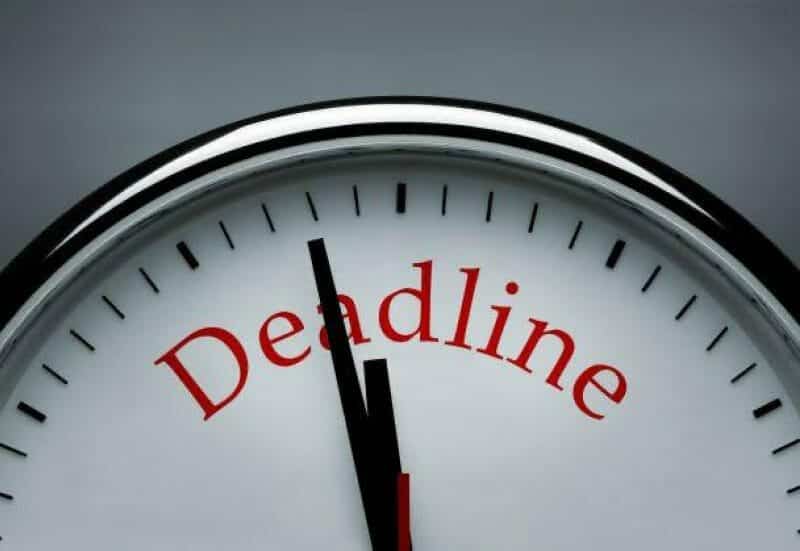Do you find yourself putting things off, and promising yourself you’ll do them later, and then never get around to doing it?
Or perhaps you leave crucial things to the last minute, because you just can’t seem to motivate yourself to do them?
If you have, you’re no stranger to procrastination.
What is procrastination?
Put simply, procrastination is the act of delaying or postponing a task or set of tasks, which prevents you from following through on what you set out to do.
Sometimes procrastination can be easy to spot, but other signs of procrastination may be harder to recognise. If you can relate to any of the following, then chances are, procrastination is a problem for you.
- you look for shortcuts or the ‘easy way’
- you’re easily distracted
- you let your emotions control your actions
- you tend to work on tasks spontaneously, without a plan
- you prefer to multi-task as opposed to focusing on one thing at a time
- you’re often running late
- you put off or avoid tasks that seem ‘too hard’
- you feel disorganised
- you feel overwhelmed
- you’re unclear about your goals
- you never seem to get things done
- you waste time on social media
- you stop and start things all the time
- you find it hard to concentrate or focus
- you doubt yourself
- you’re afraid of failing
- you believe you need to be perfect
- you envy or admire highly organised people.
Why do you procrastinate?
Some think that procrastination is a sign of laziness. However, it’s actually a reflection of your self-worth.
Unfortunately, many people define their self-worth or value by their productivity, achievements, accomplishments and capabilities. This is particularly the case for control freaks, and perfectionists who believe that unless they get everything right all the time, they’re worthless.
Procrastination is simply a product of fear of failure or not being good at something because our self-worth or value depends on it. When you put off doing something or put in less effort, it’s not because you’re lazy, don’t care or don’t want it but because you’re doing so as a form of self-protection so that if you fail it doesn’t mean you are not good enough, worthy, smart, cool, talented, capable, perfect, you just didn’t invest enough time on it. So in an attempt to protect yourself from judgement, and feeling badly about yourself, you end up procrastinating or putting off tasks. Procrastination is not being lazy, not caring or not wanting the results but it’s a way to build an excuse for not getting results as a form of self protection incase you fail.
It’s like a student being asked how much they studied before an exam. If they say they only studied for 2 hours, then they have the perfect ‘excuse’ if they end up failing the exam, or not doing as well as they hoped. What’s easier to handle — believing the reason you didn’t do well is because you didn’t spend as much time on it as you should have, or thinking it’s because you’re not good enough or smart enough?
When we only find value in what we achieve, procrastination is the ultimate way to protect ourselves from the devastation and shame we’ll feel if we put in our best efforts, yet still fail to reach our goals — whether it’s doing well on an exam, or losing weight.
What happens when you procrastinate?
While procrastination seems to have some upsides, there are many downsides as well. Here are just a few:
You’ll waste time and go backwards
If you keep putting off the things you need to do to lose weight (e.g. doing your workout, doing your weekly food prep), you’ll find that time will still go by, but nothing about your weight problem has changed. And as we’ve explained in a previous blog, if you’re not progressing, you’re actually going backwards.
You’ll waste opportunities
Whether it’s your business or your weight loss, failing to take action will result in a bunch of missed opportunities. For example, if your coach asked you to walk 3 times a week, and you didn’t because you ended up procrastinating, over a year, that’s 156 walks you would miss out on. That’s 156 opportunities you have to change your body shape and lose weight, just in walks alone!
You won’t reach your goals
When you procrastinate, you’re not taking action because you are stuck between the drive to achieve and the fear of failure. And no action = no results.
You’re confidence and self-esteem will suffer
Procrastination is born out of low self-esteem but continuing to procrastinate will only reinforce your low opinions of yourself and lower your confidence even further. This will lead to increased doubt, comparing yourself with other people, and self-sabotage.
You’ll increase your stress levels
Procrastinating is linked to stress and anxiety which impact your ability to lose weight. When you don’t do something you know you should, or need to do, you begin to feel guilty, which in turn creates stress. When you’re stressed, your sleep suffers, and you’re more likely to engage in drinking, and emotional or binge eating.
How to stop procrastinating
Have a clear goal and a reason to achieve it
Procrastination can occur if you don’t have a clear goal and a reason why you want to achieve that goal. If you haven’t set yourself a SMART goal, be sure to visit our blog to find out how to do this. You should also read our blog Find your ‘WHY’ to lose weight, to discover the importance of having a deep-seated, clear reason why you want to achieve your goals. Your clear goal, and deep WHY will be what drives you to take action, even when you don’t want to.
Break your goal into achievable chunks
Feeling overwhelmed by your goal can paralyse you from taking action. Instead, set yourself milestones or mini-goals to aim for.
Celebrate ALL your success
Not celebrating your success or giving yourself credit for what you do can continue the cycle of putting value in what you achieve, because you’re only focusing on making big changes. The truth is when it comes to weight loss, small changes add up to BIG success. To understand this fully, read our blog The snowball effect: Why small things add up to big weight loss. All success — big and small — needs to be celebrated. Not only does this provide you with momentum to keep going, but it helps you understand the power of the smaller, seemingly non-important actions you take, or the least visible forms of success.
Focus on the journey
It may sound cliché, but learning to focus on the journey can help you take action. Focusing on the end-goal or result can cause you to doubt yourself and overthink what it will mean if you don’t achieve it. This leads to procrastination. However, focusing on the journey — the actual steps you need to take to reach your goal — can feel more ‘do-able’. And don’t get too ahead of yourself with this either. Focus on the daily steps because if you complete those, then you will reach your goal without any stress or overthinking getting in the way.
Be okay with being out of control
One of the fears that drives procrastination is not being in control of everything. It’s easy to think that by taking no action, you can control your environment. After all, taking action can be risky! But to be able to lose weight and keep it off, you need to be willing to do things you haven’t done before. This means taking risks, and taking action. Once again, focus on the small, daily actions that you can control and let go of what you can’t control. Our blog How to feel in control when everything is out of control, will show you how to let go of your need to control everything, so you can get on with your weight loss journey.
Set boundaries
Setting boundaries around your behaviours can prevent you from procrastinating. For example, if you know you need to do your weekly food prep, but are putting it off and letting yourself get distracted with social media or TV, set a boundary that you don’t watch TV or go on your social media until your food prep is done. This boundary strategy will work for all the things that you procrastinate about. By setting boundaries, you’ll have greater clarity around the things you will and won’t do, and you’ll be more likely to keep choosing to do the things that will help you consistently make progress.
Stop worrying what other people think
Worrying about what other people might think of you can also cause you to procrastinate. That’s because you’re afraid that others will judge you for the actions you’re taking. Caring what others think of you and being afraid to take action because of this will only hurt your weight loss efforts and keep you going around in circles. To learn how to get over this habit, be sure to read our blog Why caring what others think leads to weight gain, and how you can stop caring.
Be accountable
Working with a coach and making yourself accountable to them will help you kick your procrastination habit, and help you take action towards achieving your weight loss goals. Being accountable will increase your chances of succeeding by 95%! Why? Because accountability will help you be consistent with the habits and actions that will lead to weight loss success. And it’s consistency, rather than perfection, that will help you lose weight.
Start taking action
At the end of the day, if you want to lose weight you need to start taking action and to do that, you need to overcome your fears — fear of judgement, fear of failure, and fear of what others think. However, confronting your fears head on isn’t easy which is why most people don’t do it.
That’s where we come in. Because we’re not personally involved in your situation, or have the same fears that you do, we can recognise the things that are causing you to procrastinate. Once we are aware of these things, we can develop a personalised plan designed to help you get over your fears, and your habit of procrastination.
If you’re ready to stop procrastinating and start taking action, we can help.
Through our Confidence Avalanche Body & Lifestyle Program, we can provide you with a structured action plan, with the necessary accountability that will help you finally take action to create the life you really want.
Right now our Transformation Program is open, both face-to-face or online . Our program will give you the right advice and guidance on the things to do, that will help you lose weight and keep it off for life.
Find out how it works and then, click the link below to see if you qualify.
We only offer our face-to-face or online program to people who are ready to change. However, if you’re not ready to commit to our online program, sign up to myPersonalised eCoaching program, our NEW state-of-the-art, at-home, do-it-yourself 6-week program designed to help you bridge the gap between exercise and long-term results. Customised for you to reach your personal goals, build healthy habits around mindset, discipline, nutrition and exercise that stick, and transform your life. You get 12-months’ worth of content compressed into 6 weeks, complete with worksheets, personalised action steps and resources. You also have lifetime access so you can learn at your own pace, and revisit any lessons you need to.


















